Bitcoin soars close to record high
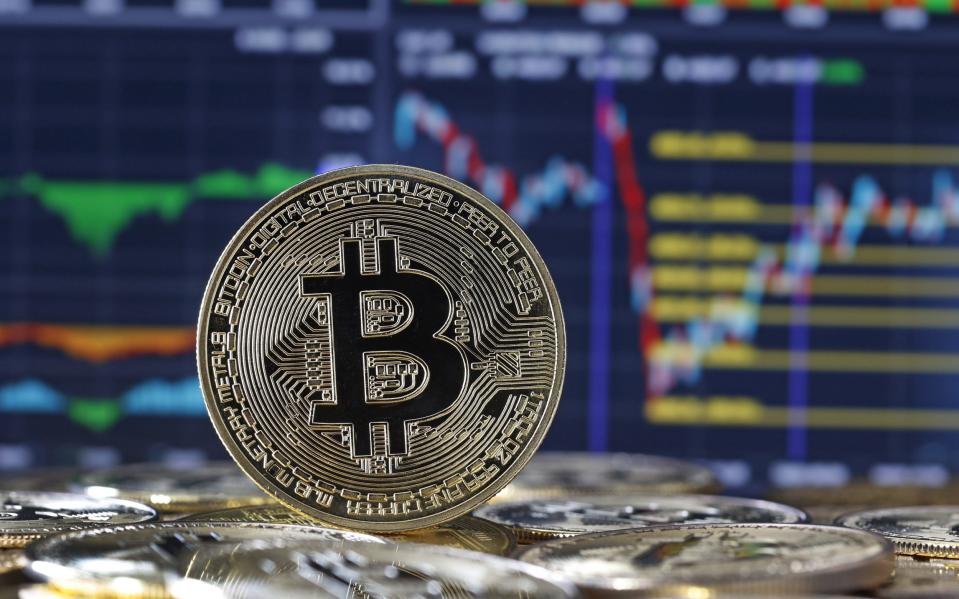
Bitcoin has topped $60,000 for the first time in more than two years amid a flurry of excitement after the approval of wider trading methods in the US.
The world’s largest cryptocurrency has surged by more than 42pc in February in what is the largest monthly gain since December 2020 during the pandemic-era boom.
Bitcoin was last up about 6pc today to $60,376 - its highest since November 2021, when it hit a record just below $70,000.
It comes as traders have poured money into the digital token following the approval of so-called spot exchange traded funds, known as ETFs.
The financial instruments allow investors to speculate on movements in the price of crypto without the risk of owning the asset.
Joseph Edwards, head of research at Enigma Securities, said: “Essentially, we’re seeing the ETF effect ahead of schedule.
“Inflows into them stepped up quickly last week and have been sustained, and we think it’s reflective of advisors getting out there very quickly to start selling the ETFs to clients.”
Antoni Trenchev, co-founder of Nexo crypto exchange, added: “If $60,000 doesn’t whet the appetite, consider that 70pc of bitcoin supply has remained unmoved for a year, and the little that’s left is being hoovered up by the likes of BlackRock and Fidelity, just as rewards for miners are about to be slashed in half. The stars are aligning for bitcoin.”
Read the latest updates below.
06:29 PM GMT
Signing off
Thanks for joining Chris and me today. We’ll be back on the blog tomorrow, but there among the stories elsewhere on The Telegraph site, here are four key business ones:
05:56 PM GMT
European central banker points to June for potential interest rate cut
In a glimpse of what Europe’s central bankers are thinking, Gediminas Simkus, a European Central Bank governing council member, has told Econostream Media:
As I see it, June is really the month to consider the rate cut.
05:02 PM GMT
Extinction Rebellion activist detained during protest against insurers
Extinction Rebellion activists have been protesting in the City of London for a third day today, demanding that companies stop insuring fossil fuel projects. Here, police officers detain a protester who set off a smoke flare.
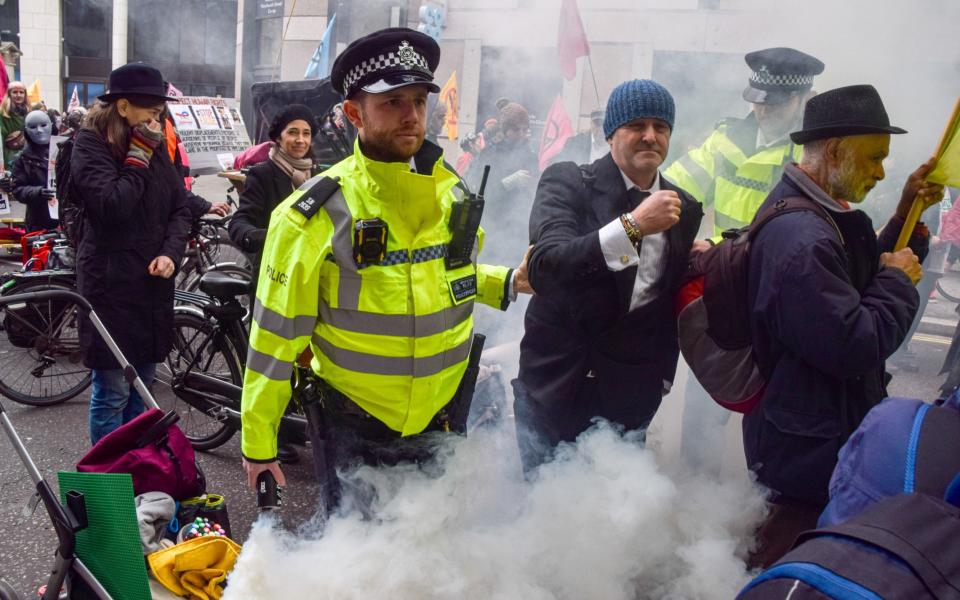
04:57 PM GMT
Footsie closes down
The FTSE 100 closed down 0.76pc today. The biggest riser was Rolls-Royce, up 3.32pc, followed by JD Sports, up 2.44pc. The biggest faller was investment firm St James’s Place, which plunged 18.55pc, followed by Strepsils maker Reckitt, down 13.29pc.
The FTSE 250 fell 0.78pc. The biggest riser was Bank of Georgia, up 1.77pc, followed by component manufacturer Essentra, up 1.60pc. The biggest faller was magazine publisher Future, down 7.64pc, followed by Rolex retailer Watches of Switzerland, down 6.45pc.
04:52 PM GMT
Profits in Chinese internet giant halve
Profits in Baidu, China’s most popular search engine, plunged by 48pc in the last quarter of 2023 amid rising marketing spending and increased investment in artificial intelligence.
Robin Li, Baidu’s chief executive, said that that company was “paving the way for the gradual creation of a new growth engine”. He said the internet giant would “enhance operational efficiencies” during 2024.
In the final quarter, revenues were up 6pc to $4.92bn, while profits fell to $366m.
For the whole of 2023, revenues rose 9pc to $18.96bn, while profits rose 169pc to $2.86bn.

04:34 PM GMT
Former chancellor takes new directorship
Lord Hammond, the former chancellor, is to become chairman of Railsr, the fintech business best known for buying the UK arm of Wirecard.
Sky News said that Lord Hammond will replace Rick Haythornthwaite, who is taking over as chairman of NatWest Group in April.
In a statement released to Sky News, Lord Hammond said he was joining Railsr at a “pivotal moment in its development”.
The peer chairs Copper Technologies, is a senior adviser to OakNorth Bank and is a partner at investment firm Buckthorn.
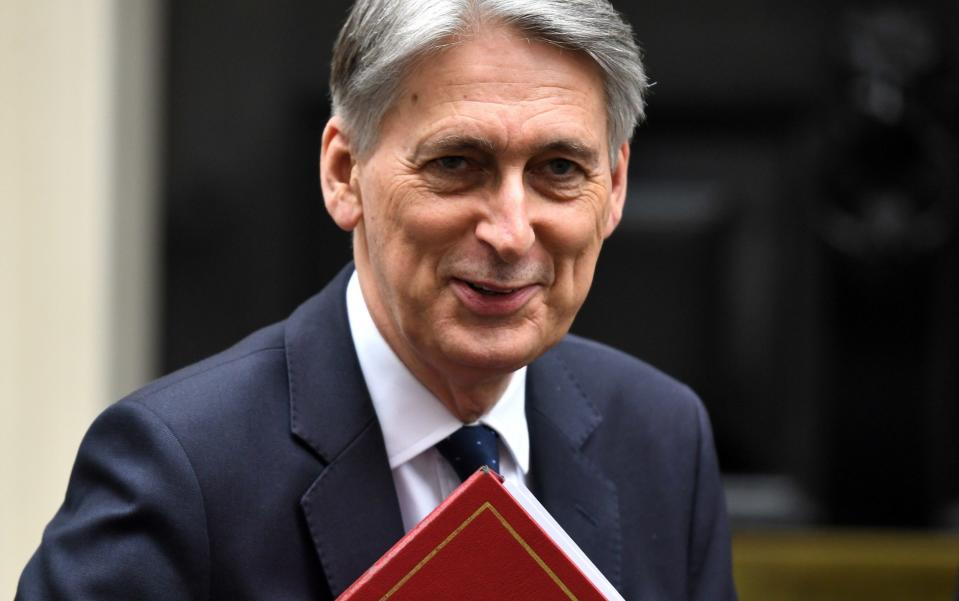
04:13 PM GMT
France calls for global minimum tax on the super-rich
France wants a new push for a global minimum tax on the super-rich. During a visit to a G20 meeting in Sao Paulo, today, its finance minister Bruno Le Maire said:
Currently the richest people can avoid paying the same level of tax as other people who are less rich. We want to avoid such tax optimisation ...
We want Europe to take this idea of minimum taxation of individuals forward as quickly as possible, and France will be at the forefront.
He said it only made sense to crack down on tax optimisation by the super-wealthy at the international level in line with what has been achieved with a global minimum corporate tax.
More than 140 countries have so far backed a 2021 agreement to apply a corporate income tax of at least 15pc from this year to discourage multinational groups from shopping around for countries with the best tax rates.
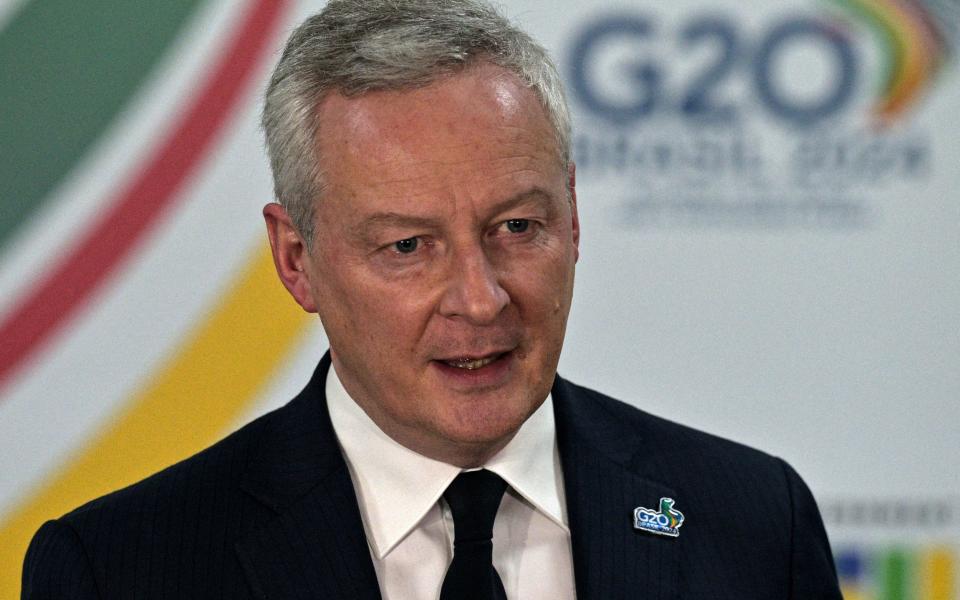
04:03 PM GMT
India warns over World Trade Organisation ‘standstill’
A US-led push to reform the World Trade Organisation’s embattled dispute settlement system sparked divisions at a WTO meeting in Abu Dhabi today, with India accusing Washington of bringing the trade body to a “standstill”.
The Trump presidency brought the system to a grinding halt in 2019 by blocking the appointment of new judges to the WTO’s appeals court.
Washington has accused the appeals court of over-interpreting WTO rules, with US Trade Representative Katherine Tai today saying the now-defunct body was formerly more powerful than member states.
It was “extremely activist, extremely powerful, more powerful than even the members, where members could secure new rules through litigation and not have to rely on the very hard work of negotiating with each other,” she said.
Washington’s push for reform has angered India.
India threatened to hold off on any new deals before progress is made on the appeals court, which could imperil agreements on fisheries subsidies and agriculture, largely seen as the main agenda items of the current ministerial talks.

03:59 PM GMT
Regulators gives Boeing 90 days to deliver plan to raise standards
America’s Federal Aviation Administration (FAA) is giving Boeing 90 days to come up with a plan to fix quality problems and meet safety standards for building new planes.
The regulator said the directive follows meetings with top Boeing officials including the company’s boss at the FAA’s headquarters in Washington.
Mike Whitaker, the FAA Administrator, said:
Boeing must commit to real and profound improvements. Making foundational change will require a sustained effort from Boeing’s leadership, and we are going to hold them accountable every step of the way …
Boeing must take a fresh look at every aspect of their quality-control process and ensure that safety is the company’s guiding principle.
The new deadline is being set as the FAA finishes an audit of assembly lines at the factory near Seattle, where Boeing builds planes including the 737 Max that suffered a door-panel blowout in January. Investigators say bolts that help keep the panel in place were missing after repair work on the Alaska Airlines jet at the Boeing factory.
A Boeing spokesman said:
By virtue of our quality stand-downs, the FAA audit findings and the recent expert review panel report, we have a clear picture of what needs to be done. Transparency prevailed in all of these discussions. Boeing will develop the comprehensive action plan with measurable criteria that demonstrates the profound change that Administrator Whitaker and the FAA demand. Our Boeing leadership team is totally committed to meeting this challenge.
Shares in Boeing are up 2.66pc in trading today.
03:39 PM GMT
Taylor Wimpey down 4.5pc after plunge in profits
The FTSE 100 housebuilder Taylor Wimpey has continued to slide on the stock market today, with shares down around 4.5pc after saying it would build fewer homes this year and revealing disappointing results.
Aarin Chiekrie, an equity analyst at Hargreaves Lansdown, explains:
Taylor Wimpey’s put in a relatively resilient showing given the difficult market conditions of 2023. Full-year operating profits came in at the top end of group guidance, but this still represents a roughly 50pc fall from the prior year’s levels.
A combination of real house price declines and lower mortgage rates have helped to ease some of the affordability pressures for buyers since the beginning of 2023, and these trends appear to have carried into the new year.
According to Rightmove, the first six weeks of 2024 saw a 7pc increase in buyer enquiries year-on-year. A low activity base could set the scene for a better performance in 2024, with Taylor Wimpey’s trading early in the new year also seeming to support this view.
03:34 PM GMT
Direct Line confirms it rejected takeover bid
Direct Line has confirmed it received an initial bid from Belgian insurer Ageas as it became the latest British listed company to become the focus of a potential foreign takeover.
In a stock market announcement, the company said it “received a highly conditional, non-binding indicative proposal” at 233p per share.
It added:
The board considered the proposal with its advisers and considered it to be uncertain, unattractive, and that it significantly undervalued Direct Line Group and its future prospects while also being highly opportunistic in nature.
Accordingly, the Board unanimously rejected the proposal on January 29, 2024.
It advised shareholders to “to take no action in relation to the possible offer”.
With that, I will head off for the day and hand you over to the ever eager Alex Singleton, who is poised to furnish you with the latest updates into the evening.
03:24 PM GMT
Bitcoin in ‘FOMO kind of rally’
Bitcoin’s intense rally has put the world’s largest cryptocurrency on pace for its biggest monthly gain since December 2020, when the digital token jumped 50pc to around $9,600.
Bitcoin has more than tripled in value since the start of last year, climbing back from a 64pc plunge in 2022, in a remarkable comeback from a series of crypto-industry scandals and bankruptcies that had raised questions about the viability of digital assets.
Many analysts believe the recent surge has also been driven by the fear of missing out, known as FOMO.
Zaheer Ebtikar, founder of crypto fund Split Capital, added:
We are starting to see a pretty clear FOMO kind of rally.
More and more people are just convinced to buy.
03:11 PM GMT
Bitcoin ‘halving’ helps fuel rally
An upcoming reduction in bitcoin’s supply growth, known as the halving, is adding to the optimism which has driven its price towards its record high.
After the halving, expected in late April, the number of new coins mined daily will decline to 450 from 900 currently.
If this demand stays constant, with supply of new coins cut in half, advocates are predicting that the price has room to rally.
Dan Slavin, founder of Chainview Capital, a crypto hedge fund, said:
All of this combined makes for a supply and demand imbalance.
More demand than supply means price higher, and with BTC price volatility, price higher doesn’t mean 10pc, it means a whole lot more.
Ryan Kim, head of derivatives at digital-asset prime brokerage FalconX, added: “It’s pretty nuts.”
02:59 PM GMT
World at risk of permanently higher taxes as borrowing hits $11.5 trillion
Countries around the world are borrowing relentlessly at a scale far above pre-pandemic levels, credit ratings agency Standard and Poor’s has warned, raising the risk of permanently higher taxes.
Our deputy economics editor Tim Wallace has the details:
War, energy subsidies, welfare spending and high interest rates are all forcing governments to borrow more as they fail to bring their finances under control.
Economists fear it will force politicians to ramp up taxes across the globe as debt repayments increase in size and the desire for more spending grows.
Nations will borrow $11.5 trillion (£9.1 trillion) in long-term debt this year, S&P forecast.
This graph shows how Britain’s debt bill is surging and see below how global debt is growing.
02:46 PM GMT
Bitcoin hits two-year high as Wall Street embraces crypto
Exchange-traded funds (ETFs) linked to bitcoin have theoretically enabled a wider public to invest in the cryptocurrency without having to hold it directly.
The funds themselves, however, do invest in the digital currency. Bitcoin ETFs were approved by US securities regulators on January 10, when the price was around $46,412.
Mikkel Morch of specialist fund ARK36 said US ETFs have “injected a fresh wave of optimism, propelling trading volumes and spotlighting crypto-linked firms”.
Bitcoin, which last traded at about $60,123, is closing in on its all-time high of $68,991 hit in November 2021.
02:34 PM GMT
Wall Street opens lower as US economy remains strong
US stock markets dropped at the opening bell as official figures showed the US economy grew 3.2pc at the end of last year, in a sign the Federal Reserve is unlikely to change its stance on interest rates any time soon.
The Dow Jones Industrial Average has fallen 0.5pc to 38,754.79, while the benchmark S&P 500 fell 0.4pc to 5,060.17.
The tech-heavy Nasdaq Composite was down 0.6pc to 15,949.64.
02:13 PM GMT
ATP Tour signs ‘multi-year’ Saudi deal
The ATP Tour and Saudi Arabia’s Public Investment Fund (PIF) have signed a multi-year strategic partnership, the governing body of men’s tennis said, in a move highlighting the growing influence of the Gulf nation on global sport.
The PIF will now become the official naming partner of the men’s rankings as well as partner ATP tournaments in Indian Wells, Miami, Madrid, Beijing, the season-ending ATP Finals in Turin and the Next Gen ATP Finals in Jeddah.
In a joint statement, the two bodies said the partnership marked “a significant shared commitment to enhancing global tennis”.

02:01 PM GMT
Bitcoin tops $60,000 for first time in two years
Bitcoin has topped $60,000 for the first time in more than two years amid a flurry of excitement after the approval of wider trading methods in the US.
The world’s largest cryptocurrency has surged by more than 42pc in February in what is the largest monthly gain since December 2020 during the pandemic-era boom.
Bitcoin was last up about 6pc today to $60,376 - its highest since November 2021, when it hit a record just below $70,000.
It comes as traders have poured money into the digital token following the approval of so-called spot exchange traded funds, known as ETFs.
The financial instruments allow investors to speculate on movements in the price of crypto without the risk of owning the asset.
Joseph Edwards, head of research at Enigma Securities, said: “Essentially, we’re seeing the ETF effect ahead of schedule. Inflows into them stepped up quickly last week and have been sustained, and we think it’s reflective of advisors getting out there very quickly to start selling the ETFs to clients.”
Antoni Trenchev, cofounder of Nexo crypto exchange, added: “If $60,000 doesn’t whet the appetite, consider that 70pc of bitcoin supply has remained unmoved for a year, and the little that’s left is being hoovered up by the likes of BlackRock and Fidelity, just as rewards for miners are about to be slashed in half. The stars are aligning for bitcoin.”
01:47 PM GMT
Wall Street poised to slump as US economy stays strong
US stock indexes look poised to slump at the start of trading later after growth in the US economy was revised lower for the end of last year - but not enough to trigger a rethink in Federal Reserve policy on interest rates.
Many investors are also keeping their power dry ahead of the personal consumption expenditures (PCE) price index on Thursday, the Fed’s preferred inflation gauge, which is likely to show prices rose on a monthly basis in January.
Stocks have struggled in the days leading up to the report after a scorching rally in the previous week that was fuelled by upbeat earnings reports and euphoria around the potential for artificial intelligence.
The rally looks poised to hit the buffers, at least temporarily, after official figures showed US GDP grew by 3.2pc in the final quarter of 2023.
In premarket trading, the Dow Jones Industrial Average was down 0.2pc, the S&P 500 had dropped 0.3pc and the Nasdaq 100 had fallen 0.4pc.
01:41 PM GMT
US economy grew 3.2pc at end of 2023
The US economy grew by a robust 3.2pc in the final three months of last year as it was buoyed by healthy consumer spending, official figures show.
The expansion in the nation’s gross domestic product (GDP) — the economy’s total output of goods and services — slipped from a red-hot 4.9pc between July and September, according to the Commerce Department.
However it was a slight downgrade from initial estimates of 3.3pc.
US growth has now topped 2pc for six straight quarters, defying fears that high interest rates would tip the world’s largest economy into a recession.
Far from stumbling, the economy grew 2.5pc for all of 2023, topping the 1.9pc growth in 2022.
United States GDP Growth Ratehttps://t.co/sUMfkn31hz pic.twitter.com/SwChWleNVk
— TRADING ECONOMICS (@tEconomics) February 28, 2024
01:29 PM GMT
Direct Line becomes latest British company to face foreign takeover bid
Belgian insurer Ageas has confirmed that it is considering making a £3.1bn bid for Direct Line after losses hit its share price.
Ageas said it was examining a possible offer 233p per Direct Line share, representing a premium of 42.8pc on its closing share price of 163.35p.
Shares in the British insurer have leapt 27.4pc following the announcement.
Last year it agreed to sell its brokered commercial insurance business after revealing deepening losses.
The company, based in Bromley, south-east London, posted a pre-tax loss of £76.3m in the first half of 2023, compared to £197m in profits recorded in the previous year.

01:04 PM GMT
FTX founder begs judge to reject calls for ‘barbaric’ 100-year prison sentence
Sam Bankman-Fried is pleading with a US court to reject a recommended 100-year prison term, as lawyers for the disgraced crypto tycoon described the sentence as “barbaric”.
Our senior technology reporter Matthew Field has the latest:
In a court filing released on Tuesday, Mr Bankman-Fried’s lawyers claimed the FTX founder should only serve up to six years for his role in the fraud.
This is in response to a recommendation from government officials who have called for Mr Bankman-Fried to spend 100 years behind bars.
FTX filed for bankruptcy in late 2022 after a multibillion-dollar black hole was uncovered in its accounts.
Mr Bankman-Fried, 31, was accused of orchestrating a $10bn (£7.9bn) fraud, siphoning off customer funds to fuel high-risk crypto trades and fund a luxury lifestyle in the Bahamas.
Read why lawyers have urged judges to implement a more lenient sentence.

12:28 PM GMT
Thousands of Welsh farmers protest after Brexit rule change
Thousands of farmers are expected to descend on Cardiff today for what could be one of the biggest farming protests the country has seen.
Niamh Robinson and Emma Gatten have the details:
Up to 10,000 farmers, vets and other agricultural workers are expected to protest around the Senedd as ministers meet for talks on changes to the Welsh farming system.
Farmers are angry over proposals from the Welsh Labour Government to overhaul EU-era subsidies, which would see farmers expected to ensure 20 per cent of their farms are dedicated to tree planting and wildlife.
On Tuesday the Welsh Government said it would review the plans, which are currently under consultation.
Follow our live blog on the protests.

12:24 PM GMT
Co-operative Bank profits slump as it compensates mortgage customers
The Co-operative Bank revealed its yearly profit nearly halved after it set aside cash to compensate mortgage customers from more than a decade ago.
The bank, which has about 2.6m customers and says it is the UK’s leading ethical bank, said 2023 had been “a year of transformation” as it spent more money on improving its own systems.
It reported a pre-tax profit of £71.4m, shrinking from the £132.6m it made in 2022, after it set aside nearly £29m to cover the costs of a redress scheme to compensate mortgage customers from 2011 and 2012.
It followed complaints being upheld by the Financial Ombudsman Service relating to an increase in the rate of its standard variable mortgage rate, which most people move to once their fixed-term deal comes to an end.
Co-op Bank said it had decided to compensate customers who might have been affected, regardless of whether or not they had complained.
Meanwhile, chief executive Nick Slape said the bank continues to be in “exclusive discussions” with Coventry Building Society over a possible merger of the two high street lenders, which was first announced at the end of last year.
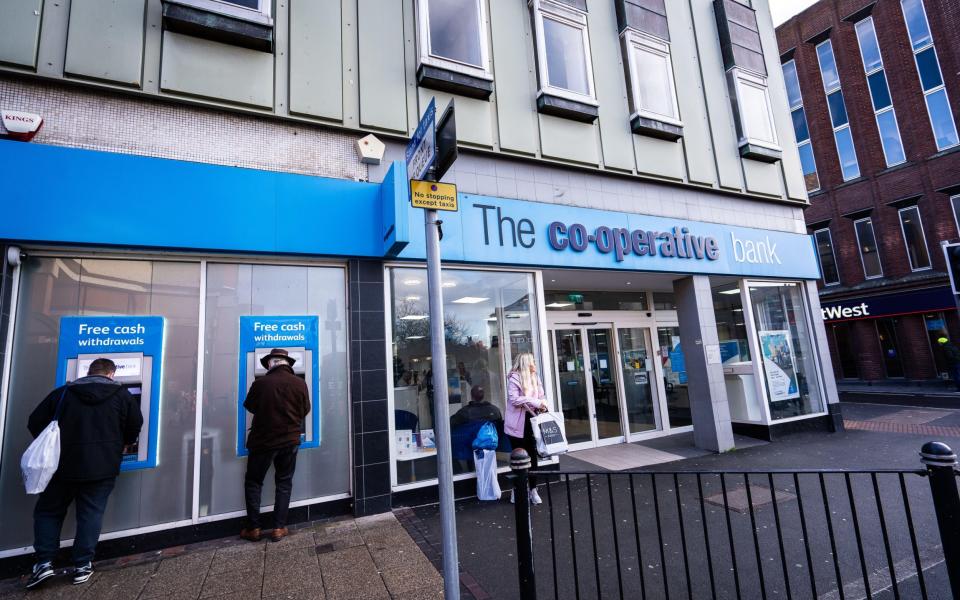
12:01 PM GMT
Halving inflation has broken biggest barrier to Scottish growth, says minister
As Scotland’s GDP contracted at twice the pace of the UK, Scottish Secretary Alister Jack said:
The UK Government has halved inflation and, in doing so, we’ve broken down the single biggest barrier to growth.
We are sticking to our plan to achieve long-term sustainable recovery.
We are boosting business and encouraging trade and opportunities by investing more than £2.9bn directly across all parts of Scotland.
We’re also putting more money in the pay packets of 2.4m people in Scotland by cutting national insurance and rewarding hard-working families with the biggest ever increase to the national living wage from next month.
11:50 AM GMT
Direct Line shares surge amid takeover speculation
Shares in Direct Line jumped after reports that it has rejected a takeover approach from Belgian insurer Ageas.
The British insurer rose by more than 12pc after it rebuffed the approach, according to Bloomberg News.
Direct Line has been contacted for comment.
11:32 AM GMT
Pound falls despite higher rate expectations
The pound has slipped for the first time in seven days against the dollar despite the Bank of England deputy governor Sir Dave Ramsden saying he felt inflation risks remains “elevated”.
Sterling has fallen 0.3pc today to $1.26 but remains the best performer among the G10 group of major currencies so far this year amid expectations that interest rates will stay high for longer in Britain.
In the debt market, the yield on benchmark 10-year UK gilts has fallen two basis points to 4.17pc.
11:07 AM GMT
Klarna reveals losses ahead of expected stock market listing
Buy-now-pay-later company Klara revealed shrinking losses as it gears up for one of the biggest stock market listings of the year.
The Swedish fintech company said losses fell by 76pc last year to 2.5bn Swedish krona (£190m) while revenue rose by 22pc to 23.5 billion krona (£1.8bn).
The company suffered a 400m krona loss in the fourth quarter of 2023, after recording its first quarterly profit in four years in the previous three months.
Chief executive Sebastian Siemiatkowski said:
While we continue on our journey to long-term profitability, we made a conscious decision to invest in growth in the peak shopping season of Q4.
We will continue to invest wisely for growth and focus on being cost-effective, on our path towards annual profitability.
It comes as the company, which offers short term interest-free loans for online and offline purchases, is preparing for an initial public offering (IPO) which could value the business at about $20bn (£15.8bn), according to Bloomberg News.

10:41 AM GMT
Eurozone ‘close to recession’ amid falling consumer confidence
Consumer confidence fell across the eurozone in February, official estimates show, indicating the European economy “is close to recession”.
The European Commission’s (EC) Economic Sentiment Indicator (ESI) decreased slightly across the single currency bloc by 0.7 points to 95.4.
It follows lower confidence among services, retail trade and construction managers. Sentiment deteriorated most markedly in Italy, followed by Germany and Poland.
Andrew Kenningham, chief Europe economist at Capital Economics, said:
The EC business and consumer survey for February reinforces the message that the economy is close to recession and that, although price pressures in the services sector eased slightly, they remain uncomfortably high.
The fall in the EC ESI from a downwardly-revised 96.1 in January to 95.4 in February left it below expectations.
On past form, this is consistent on past form with the economy continuing to stagnate in Q1.
Quite a downbeat economic sentiment survey for the eurozone with the service sector indicating a worsening of demand and of expectations.
The upside comes from services inflation expectations which ticked down after 4 months of rises. Bit of a relief for inflation at least. pic.twitter.com/hnFaEJx7gE— Bert Colijn (@BertColijn) February 28, 2024
10:32 AM GMT
Scottish economy shrinks twice as fast as UK
GDP in Scotland fell by twice as much as it did in the UK in the final three months of last year, official figures show.
But Scotland has not yet gone into recession, according to the data, despite the economy shrinking by 0.6pc over the period October to December.
In the UK as a whole, GDP fell 0.3pc over the same period - putting the country into recession as it was the second consecutive quarter of negative economic growth.
In Scotland, the fall of 0.6pc came after growth of 0.4pc between July and September, meaning there have not been two consecutive quarters where GDP has fallen - which defines a recession.
A Scottish Government report said:
In 2023 quarter four (October to December), Scotland’s GDP fell by 0.6pc in real-terms compared to quarter three, following growth of 0.4% in quarter three.
Over quarter four, GDP for the UK as a whole fell by 0.3pc.
The data shows that in the final three months of 2023, the services sector, which makes up the bulk of Scotland’s economy, decreased by 0.1pc.
10:14 AM GMT
Oil prices fall as US stocks grow
Oil prices have fallen as the US increased its stockpiles.
Global benchmark Brent crude dropped 0.9pc below $83 a barrel after advancing by 2.5pc across Monday and Tuesday.
West Texas Intermediate was down 1.1pc to $78.
It comes after the industry-funded American Petroleum Institute said nationwide crude holdings had risen by more than eight million barrels.
Commodity and stock markets have been subdued so far this week ahead of the closely-watched PCE report in the US, which is the Federal Reserve’s preferred measure of inflation.
10:02 AM GMT
Aston Martin delays plans for first electric car
Aston Martin has pushed back its plans for its first electric car as its chairman pushes ahead with its turnaround plan.
The luxury car maker said it expects to launch its first battery electric vehicle (EV) in 2026, delaying its previous ambitions by a year.
Last year it struck a deal with Saudi-backed US luxury electric car company Lucid as it seeks to design its next generation of luxury cars with batteries. Lucid took a 3.7pc stake in Aston as part of the deal.
The delay comes after the boss of German car giant Mercedes-Benz has said it will make petrol cars “well into the 2030s” as it watered down its targets for electric vehicle sales.
Meanwhile, Sir Jim Ratcliffe last week accused British and European governments of forcing electric cars “down the consumer’s throat”, as he prepares to sell a new battery-powered 4x4 that will have a backup petrol engine.
Aston Martin revealed operating losses improved by 22pc to £111.2m last year, while revenues increased by 18pc to £1.6bn as average selling prices hit record levels.
Its billionaire chairman Lawrence Stroll, who is also the company’s biggest shareholder, is hunting for his fourth chief executive in four years.
Aston Martin’s shares seesawed in early trading but were last up 0.1pc.

09:42 AM GMT
St James’s Place to pay overcharging victims up to £426m as shares collapse
St James’s Place has set aside £426m for customers who overpaid for advice and fees sparking a 31pc fall in the company’s share price.
Our money reporter Madeleine Ross has the details:
The wealth manager announced a major overhaul of its fees last year, following the introduction of new consumer duty rules by the financial watchdog.
It scrapped its exit fees and capped advice and fund charges, after an investigation by The Telegraph found that customers were paying thousands more for pension advice compared to St James’s Place’s rivals.
In its results for 2023, the wealth manager – which has more than 900,000 clients – wrote that it would provide £426m, or £323.7m post-tax, for “potential client refunds linked to the historic evidencing and delivery of ongoing servicing”.
Chief executive Mark FitzPatrick said the firm’s cash result had been significantly impacted by the assessment into advice and fees.
Read how its latest results have wiped £392m off its valuation.
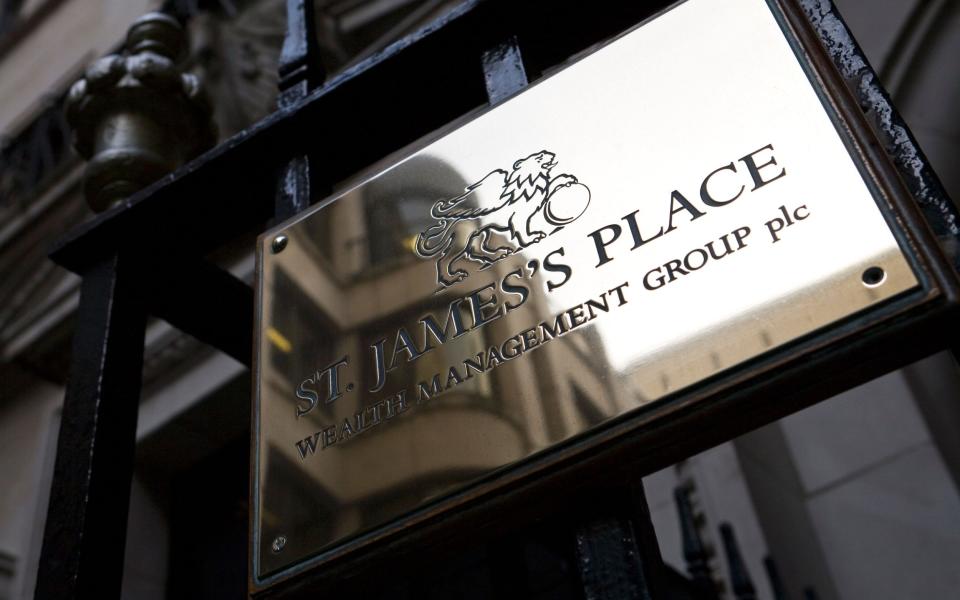
09:34 AM GMT
Taylor Wimpey expects to complete fewer homes amid planning delays
Taylor Wimpey said it will build fewer homes this year, only days after Britain’s competition watchdog concluded that the sector limited supply to maintain its prices.
The housebuilder said its first-half operating profit margin would reflect slightly lower pricing in the homes it has coming through, blaming cost inflation and investment.
Taylor Wimpey joins other developers that have cut back their building targets as the Bank of England hiked borrowing costs to tame inflation, making houses more expensive.
The industry routinely complains that Britain’s complex planning system is delaying the delivery of new homes.
Chief executive Jennie Daly said there were some signs of improvement as mortgage rates ease which was “positively impacting” affordability, after reporting a 49pc slump in annual profit, in line with market expectations. She said:
Looking ahead we are well-positioned in an attractive market, with significant underlying demand for our quality homes and are poised for growth from 2025, assuming supportive market conditions.
The company said it expects to build about 9,500-10,000 homes in Britain in 2024, excluding joint ventures, with the midpoint of the range about 7pc lower than last year’s 10,438.
Taylor Wimpey’s shares fell 3.4pc in early trade.
09:17 AM GMT
Gas prices edge higher after sharp falls
Gas prices are showing the first signs of recovery amid speculation that the low prices will stimulate demand.
Europe’s benchmark contract has risen for a third consecutive day after slumping 30pc since the start of the year.
Dutch front-month futures have gained as much as 3pc today to more than €25 per megawatt hour as temperatures are also forecast to be on the colder side in March.
Traders think there could be a revival of demand in China and Asia as buyers capitalise on the fall in global gas prices.
The UK equivalent gas contract has risen as much as 2.3pc today to 62p per therm.
08:51 AM GMT
UK markets hit by string of poor results
UK stock indexes have fallen as they were dragged down by a raft of dismal profits updates.
The FTSE 100 index slid 0.2pc and the mid-cap FTSE 250 dropped by 0.5pc.
St. James’s Place slumped 29.3pc to the bottom of the UK’s blue chip index after the wealth manager swung to an annual loss.
I was hit by a £426m provision made for potential client refunds over historic ongoing servicing complaints.
Reckitt lost 9.8pc after the consumer goods group missed fourth-quarter like-for-like net sales estimates, while Taylor Wimpey slipped 2.6pc after the homebuilder said it would build fewer homes this year and posted a 49pc slump in annual operating profit.
Aston Martin was down 2.6pc after initially opening higher as investors remained at the luxury carmaker’s continuing annual losses, which more than halved as selling prices hit record levels.
Besides the corporate updates, investors are also awaiting the consumer prices data from the US and Europe due later this week for insights into the central banks’ monetary policy path.
08:34 AM GMT
Dettol maker suffers £55m hit after ‘inappropriate’ staff conduct in Middle East
Dettol and Durex maker Reckitt has plunged in early trading after revealing a £55m hit after staff “acted inappropriately” in the Middle East.
The consumer goods giant’s shares have fallen 9.7pc after it also revealed a drop in sales over the latest quarter, amid declines in its health and nutrition arms.
The company admitted making “an understatement of trade spend in two Middle Eastern markets” which meant revenue performance was £55m lower than previously expected.
It said: “Following investigation, we concluded a small group of employees had acted inappropriately and we are taking necessary disciplinary action.”
The household goods giant said like-for-like net revenues fell by 1.2pc over the final quarter of 2023, with overall net revenues down 7pc to £3.6nn.
It added that like-for-like revenues for the full-year were up 3.5pc in 2023 against the previous year.
Kris Licht, chief executive of Reckitt, said:
While our performance in Q4 was unsatisfactory, we look to 2024 and beyond with confidence.
We target another year of mid single-digit growth in health and hygiene, driven by a more balanced contribution from price, mix and volume.

08:19 AM GMT
Halfords plunges as shoppers put off motoring improvements
Halfords has slashed its profits guidance for the current financial year as wet weather put shoppers off cycling and motoring improvements.
The retailer’s share price plunged by 22pc as it said “weak customer confidence and unusually mild and very wet weather” were partly to blame, weighing on demand for both cycling and motoring products.
The retailer said that it expects to deliver pre-tax profits of between £35m and £40m for the year to March 29, having previously forecast between £48m and £53m.
It said it cut the guidance after weakness in its cycling, retail motoring and consumer tyres operations caused a “significant drop” in retail revenues.
Halfords said cycling and retail motoring were weak as lower confidence among customers and mild, wet weather affected footfall into stores but also reduced demand for some products, such as winter car accessories and car cleaning products.
The cycling market has also “become more challenging and competitive” amid consolidation in the sector, resulting in higher levels of promotions to drive sales.

08:05 AM GMT
UK markets subdued at the open
Stock markets in London were little changed as trading began after a Bank of England deputy governor reiterated that policymakers need to see more evidence about the persistence of inflation before they can cut interest rates.
The FTSE 100 was flat at 7,685.64 while the FTSE 250 was down 0.1pc to 19,142.19 after Sir Dave Ramsden said that there were still “elevated” risks to inflation.
07:59 AM GMT
Taylor Wimpey warns of planning delays as profits plunge
Taylor Wimpey has warned about the impact of planning delays as it revealed pre-tax profits nearly halved last year.
The developer said revenues dropped 20.5pc to £3.5bn in 2023, while profits before tax dropped 47.8pc to £473.8m as buyers grappled with higher mortgage costs.
It completed 3,306 fewer homes last year, down 23pc to 10,848, as chief executive Jennie Daly said the “planning environment remains challenging”.
The company highlighted “delays and resource pressures impacting housing land supply”.
It comes as the competition watchdog found this week that planning systems across Britain were “unpredictable”, with many local authorities under-resourced and several without an up to date local plan for housing.
Taylor Wimpey was also named as one of eight of Britain’s biggest housebuilders that are under investigation for suspected illegal information sharing amid fears that collusion in the industry has pushed up prices.
The developer’s shares had gained 24pc over the last six months amid hopes that the Bank of England was poised to begin cutting interest rates this year.

07:47 AM GMT
Vodafone in talks to sell Italian business for £6.8bn
Mobile phone giant Vodafone has confirmed talks to sell its Italian business to Switzerland’s Swisscom in a deal worth €8bn (£6.8bn).
The pair said they are in advanced exclusive discussions, with the proposed agreed price on a cash basis and including debts, although the full terms of the deal are yet to be finalised.
Vodafone said: “Vodafone has engaged extensively with several parties to explore market consolidation in Italy and believes this potential transaction delivers the best combination of value creation, upfront cash proceeds and transaction certainty for Vodafone shareholders.”
It comes after FTSE 100-listed Vodafone rebuffed attempts by France’s Iliad to merge the two companies’ Italian businesses, which would have created the country’s biggest mobile phone company.
Vodafone and Iliad had revealed the talks in December last year.
The sale to Swisscom tops the €6.6bn (£5.6bn) it was set to have received as part of the Iliad tie-up.
Swisscom said it plans to merge Vodafone Italia with its business in the country, called Fastweb.
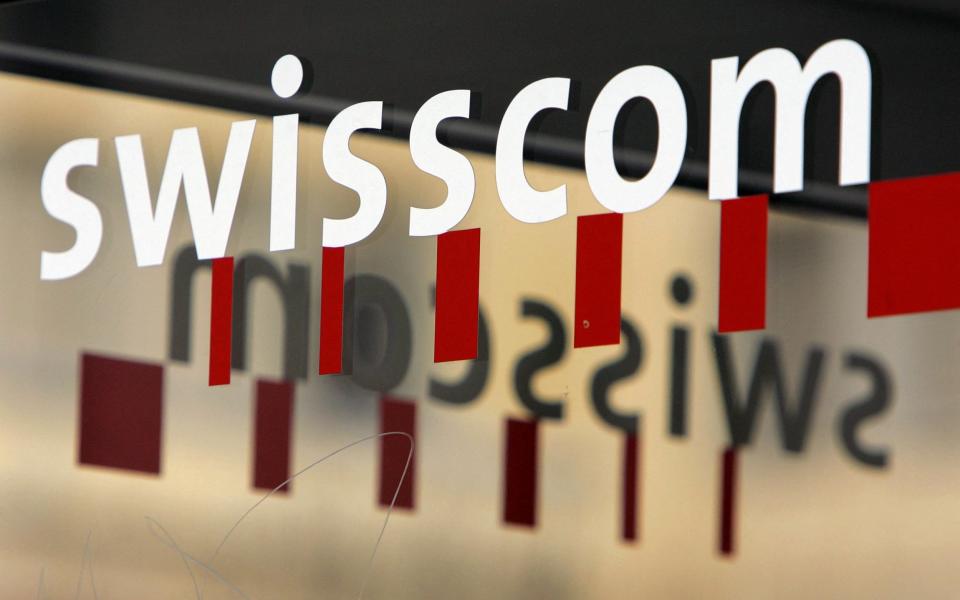
07:43 AM GMT
Aston Martin’s losses shrink as it overcomes production delays
Aston Martin’s losses shrank last year as it completed the first deliveries of its next generation DB12 sports car and overcame production delays.
The luxury car maker revealed operating losses improved by 22pc to £111.2m, while revenues increased by 18pc to £1.6bn.
It comes as its billionaire chairman is hunting for his fourth chief executive in four years.
Lawrence Stroll, who is also the company’s biggest shareholder, is said to have contacted current and former bosses of other luxury car manufacturers to ask whether they would be interested in taking the top job.
Mr Stroll said:
Critical to the long-term success of Aston Martin is the strength of our iconic global brand and loyal, as well as evolving, customer base.
Continued investment in both the brand and our go-to-market strategy are imperative to our success.
Aston Martin shares are down 93pc over the last five years and have fallen by 18pc since the start of 2024.
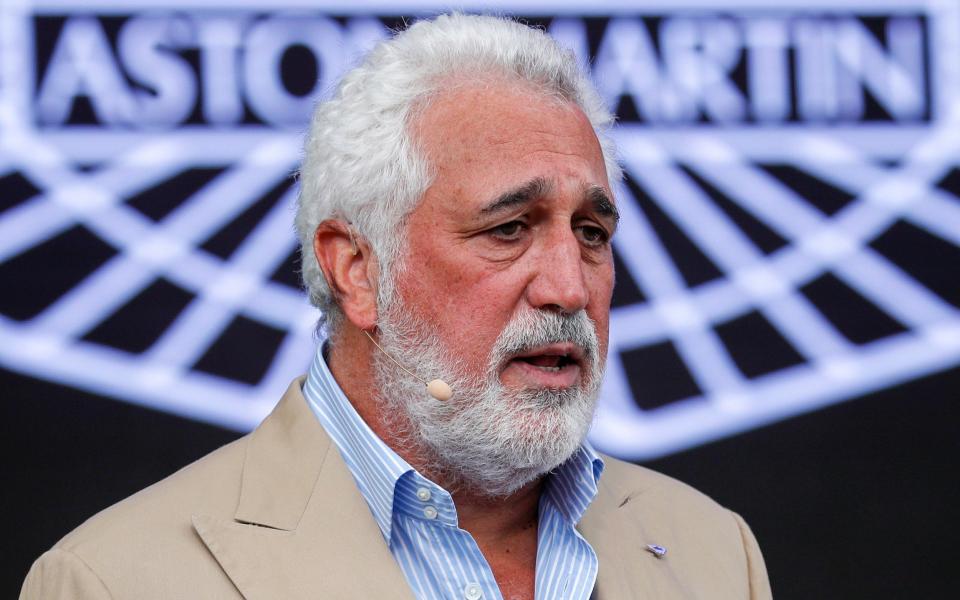
07:32 AM GMT
Good morning
Thanks for joining me. China’s largest private property developer has been hit with a winding up petition as the country’s real estate crisis deepens.
Country Garden racked up more than £150bn in debt in a property bubble that economists say has burst as demand from buyers dries up.
The petition, filed by a lender demanding payback of approximately 1.6bn Hong Kong dollars (£161m), came weeks after the city’s high court granted a similar petition against peer Evergrande, which is more than $300bn (£237bn) in debt.
Last week, Moody’s suddenly removed credit ratings for 10 Chinese developers for “business reasons”.
Country Garden said in its disclosure to the Hong Kong Exchange that it will “oppose the petition vigorously”.
It said: “The company intends to continue to proactively communicate and work with its offshore creditors on its restructuring plan, with the objective of announcing terms to the market as soon as practicable.”
5 things to start your day
1) Britain to consider tariffs on flood of cheap Chinese electric cars | Carmakers fear they are being undercut by brands that are being subsidised by Beijing
2) Surge in sick days to cost Britain £66bn | Number of working days lost to illness to more than double by 2030, warns Zurich
3) Apple scraps plans for electric cars | The cancellation comes as investors show signs of nervousness about the company’s growth potential
4) Asda loses out in battle for supermarket shoppers in new blow for Issa brothers | Billionaire owners face fresh pressure as sales growth lags behind rivals
5) How the Barclay family is losing grip on its shopping empire | A much-needed lifeline for Very Group has come at the price of control
What happened overnight
Asian markets were mostly lower on Wednesday after US stocks held near their record levels in a quiet day of trading.
Tokyo stocks ended slightly lower on Wednesday, with the benchmark Nikkei 225 index closing down 0.1pc, or 31.49 points, to end at 39,208.03, while the broader Topix index lost 0.1pc, or 3.51 points, to 2,674.95.
Chinese markets fluctuated, with Hong Kong’s Hang Seng rising 0.2pc to 16,825.00, while the Shanghai Composite lost 0.7pc to 2,995.40.
China’s largest private property developer, Country Garden, said that it is facing a liquidation petition after failing to repay a term loan facility worth 1.6bn Hong Kong dollars (£161m). The first hearing in the case is scheduled for May 17.
The move comes after China Evergrande, the world’s most heavily indebted real estate developer, was ordered to undergo liquidation following a failed effort to restructure $300bn in late January.
Hong Kong was due to release its fiscal budget, which is expected to include measures to revitalise the distressed property market.
Australia’s S&P/ASX 200 was little changed at 7,663.50 after the Australian Bureau of Statistics said the country’s inflation rate held at a two-year low in January, triggering hopes that the Reserve Bank may cut its benchmark interest rate.
South Korea’s Kospi gained 0.8pc to 2,646.55, while Thailand’s SET was down 0.5pc
In Wall Street, the S&P 500 rose 0.2pc, to 5,078.18. The Dow Jones Industrial Average of 30 leading US companies fell 0.2pc, to 38,972.41. Meanwhile, the Nasdaq Composite index rose 0.4pc, to 16,035.30.
The yield on 10-year US Treasury edged up to 4.31pc from 4.27pc late on Monday.

 Yahoo Finance
Yahoo Finance 